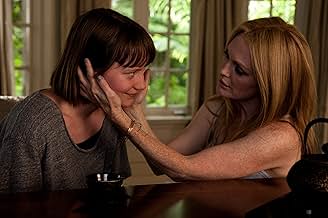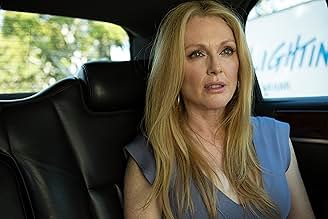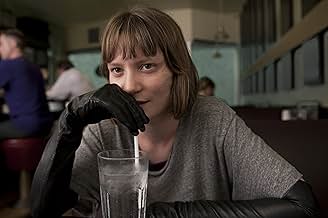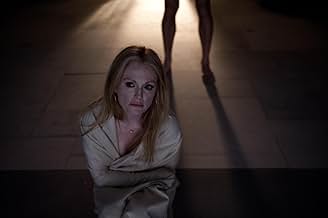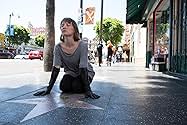IMDb-BEWERTUNG
6,2/10
43.955
IHRE BEWERTUNG
Eine Tour in das Herz einer Hollywood-Familie, die sich gegenseitig und den unerbittlichen Geistern ihrer Vergangenheit nachjagt.Eine Tour in das Herz einer Hollywood-Familie, die sich gegenseitig und den unerbittlichen Geistern ihrer Vergangenheit nachjagt.Eine Tour in das Herz einer Hollywood-Familie, die sich gegenseitig und den unerbittlichen Geistern ihrer Vergangenheit nachjagt.
- Auszeichnungen
- 10 Gewinne & 24 Nominierungen insgesamt
Empfohlene Bewertungen
Most of David Cronenberg's films range from good to outstanding. Some of his work disappointed me or evoked a relatively mixed reaction from me, but on the most part he is a very interesting director who does stand out in a good way. The cast are very talented, Julianne Moore especially, while one can understand why Cronenberg frequently used Howard Shore as his composer of choice and their collaborations is one of the best and most consistent director-composer collaborations in my view (am especially fond of his work for 'The Fly').
It is said with sadness that despite hearing good things about it (though it's understandably very polarising here), 'Maps to the Stars' disappointed me. It is far from a terrible film, don't even think it's a bad film, but it for me was a long way from great. Much to admire but do have to share some of the criticisms here, a great concept with inconsistent execution of it. As far as Cronenberg's work goes, 'Maps to the Stars' is better than 'Stereo', 'Crimes of the Future' and 'Cosmopolis' but it is a lesser film of his, nowhere near the level of 'The Fly', 'Dead Ringers', 'Eastern Promises', 'A History of Violence' and 'Spider'.
There are good things with 'Maps to the Stars'. It looks wonderful, excepting the somewhat fake-looking fire, then again it is Cronenberg whose work from the late 1970s onwards always ranked high on a visual level (of his overall output 'Rabid' and 'Shivers' were the only real exceptions in this regard). The cinematography is stylish and quite stunning to look at, sunshine has rarely blazed in such a wonderfully dazzling way in film. Shore's score is subtly unsettling and Cronenberg does deliver in the visual aspect of his directing.
Some of the satire is fiercely sharp and darkly funny and it is the satire where 'Maps to the Stars' fares best. Really admired the cast here, with Moore being excellent in the lead in her best performance in years (perhaps since 'Boogie Nights'). Evan Bird shows himself to be a young actor with huge potential, a very beyond his years performance. Have not seen a better performance from Mia Wasikowska in her most daring role and she is very affecting in it, seeing John Cusack and Olivia Williams in different roles and excelling was great to see. Robert Pattinson is much better than he was in 'Cosmopolis' and as others have said he has come on a long way since 'Twilight'.
For all those great things, 'Maps to the Stars' just didn't connect with me. Despite a promising start, there is a major change of tone that jars badly and then the film becomes unfocused and rather strange. The satirical edge is done well, but the vulgarity does get very over-the-top and mean-spirited and the cynical edge is overdone at times too. The more surreal elements didn't come over as either dreamlike or nightmarish, not much eerie here, too much of the scenes veered on ridiculous and felt very hokey. Emotionally, 'Maps to the Stars' should have been poignant but it felt too cold and clinical (Cronenberg's direction on the most part is the same). The pace can drag and with the trimming or excision of scenes that felt like padding that added nothing it would have felt much better. Cronenberg can do weird and disturbing very well, evident when he pioneered body horror, but very rarely to to such kitchen-sink or muddled effect.
Didn't feel for any of the characters apart from disgust, am aware they were not meant to be likeable and be unpleasant but the film failed too to make them properly fleshed out. The only character who came close to evoking any sympathy from me was Agatha, then her true colours were revealed and that was lost. Found that the film tried to do too many things and have too many strands and elements, and too many of them were given short shrift (the Cusack and Olivia Williams subplot was severely under-explored) or became convoluted, with too many things leaving the viewer perplexed due to being unexplained or poorly resolved. The script is not as rambling or bloated as that for 'Cosmopolis' but it is the most gratuitously crass script of any Cronenberg film and never sounds natural. The ending felt tacked on.
Altogether, not my cup of tea sadly but did find still a good number of great things about it. 5/10
It is said with sadness that despite hearing good things about it (though it's understandably very polarising here), 'Maps to the Stars' disappointed me. It is far from a terrible film, don't even think it's a bad film, but it for me was a long way from great. Much to admire but do have to share some of the criticisms here, a great concept with inconsistent execution of it. As far as Cronenberg's work goes, 'Maps to the Stars' is better than 'Stereo', 'Crimes of the Future' and 'Cosmopolis' but it is a lesser film of his, nowhere near the level of 'The Fly', 'Dead Ringers', 'Eastern Promises', 'A History of Violence' and 'Spider'.
There are good things with 'Maps to the Stars'. It looks wonderful, excepting the somewhat fake-looking fire, then again it is Cronenberg whose work from the late 1970s onwards always ranked high on a visual level (of his overall output 'Rabid' and 'Shivers' were the only real exceptions in this regard). The cinematography is stylish and quite stunning to look at, sunshine has rarely blazed in such a wonderfully dazzling way in film. Shore's score is subtly unsettling and Cronenberg does deliver in the visual aspect of his directing.
Some of the satire is fiercely sharp and darkly funny and it is the satire where 'Maps to the Stars' fares best. Really admired the cast here, with Moore being excellent in the lead in her best performance in years (perhaps since 'Boogie Nights'). Evan Bird shows himself to be a young actor with huge potential, a very beyond his years performance. Have not seen a better performance from Mia Wasikowska in her most daring role and she is very affecting in it, seeing John Cusack and Olivia Williams in different roles and excelling was great to see. Robert Pattinson is much better than he was in 'Cosmopolis' and as others have said he has come on a long way since 'Twilight'.
For all those great things, 'Maps to the Stars' just didn't connect with me. Despite a promising start, there is a major change of tone that jars badly and then the film becomes unfocused and rather strange. The satirical edge is done well, but the vulgarity does get very over-the-top and mean-spirited and the cynical edge is overdone at times too. The more surreal elements didn't come over as either dreamlike or nightmarish, not much eerie here, too much of the scenes veered on ridiculous and felt very hokey. Emotionally, 'Maps to the Stars' should have been poignant but it felt too cold and clinical (Cronenberg's direction on the most part is the same). The pace can drag and with the trimming or excision of scenes that felt like padding that added nothing it would have felt much better. Cronenberg can do weird and disturbing very well, evident when he pioneered body horror, but very rarely to to such kitchen-sink or muddled effect.
Didn't feel for any of the characters apart from disgust, am aware they were not meant to be likeable and be unpleasant but the film failed too to make them properly fleshed out. The only character who came close to evoking any sympathy from me was Agatha, then her true colours were revealed and that was lost. Found that the film tried to do too many things and have too many strands and elements, and too many of them were given short shrift (the Cusack and Olivia Williams subplot was severely under-explored) or became convoluted, with too many things leaving the viewer perplexed due to being unexplained or poorly resolved. The script is not as rambling or bloated as that for 'Cosmopolis' but it is the most gratuitously crass script of any Cronenberg film and never sounds natural. The ending felt tacked on.
Altogether, not my cup of tea sadly but did find still a good number of great things about it. 5/10
A film worth revisiting, if my experience is anything to go by. I didn't think it was up to much the first time, but the BBC put it on again and this time I watched it twice and probably will at least once more, partly for Julianne Moore, who's pretty astonishing, playing an almost unprecedentedly monstrous grotesque, and partly for the frequent patches of brilliantly written dialogue (take a bow, Bruce Wagner). Moore's dialogue is almost always good, but that of 13-year-old move star and recovering drug abuser Benji also packs a vicious punch, and elsewhere, more subtly, in the mouths of Mia Wasikovska and Robert Pattinson's characters, Wagner does probably the best depiction I've ever seen of how young adults actually talk a lot of the time: confused, insecure and just barely covering it up.
All this is something like what we might see - and most importantly hear - if anyone ever filmed a Brett Eason Ellis novel properly, without being afraid of going to town on the dialogue (why hasn't Cronenburg ever worked with Ellis?). As such, it's an interesting point of comparison with Cronenburg's previous film, Cosmopolis, also heavy on the chilly, anomic modern rich person dialogue, courtesy of Don de Lillo, which, taken on its own, looks like woefully pretentious proof that you can't do this in film. Turns out you can, with bells on, though actually, Cronenburg films have been demonstrating this at least since Dead Ringers.
Other than these talky highlights, I think this film has a few problems of its own, some of them maybe also around pretentiousness. The big one for me is just the messiness of the message and plot, as a unity, which it isn't really. Moore's storyline on its own is a perfect, pitilessly poisonous Hollywood satire. Does it really need, in addition, a parallel plot that never quite meshes about incest and schizophrenia? Why? To round it out to feature film length? To give it some spurious intellectual heft in the form of references to Greek tragedy and elemental symbolism?
To be honest, there may be a puzzle here that I haven't worked out, because quite a lot of that dialogue I like so much seems to be satirising precisely such tendencies, particularly when Moore's character ghoulishly invokes fire and water to implicitly celebrate the death of a child because it gets her a part. And that's another reason I might watch again. But still, the problem remains, I don't think you need the incest or the schizophrenia to satirise Hollywood, because it introduces a sort of separate issue, a distinct emotional antagonist if you will, where Hollywood itself seems like the real target and should surely be all you need to explain all this very bad behaviour.
All this is something like what we might see - and most importantly hear - if anyone ever filmed a Brett Eason Ellis novel properly, without being afraid of going to town on the dialogue (why hasn't Cronenburg ever worked with Ellis?). As such, it's an interesting point of comparison with Cronenburg's previous film, Cosmopolis, also heavy on the chilly, anomic modern rich person dialogue, courtesy of Don de Lillo, which, taken on its own, looks like woefully pretentious proof that you can't do this in film. Turns out you can, with bells on, though actually, Cronenburg films have been demonstrating this at least since Dead Ringers.
Other than these talky highlights, I think this film has a few problems of its own, some of them maybe also around pretentiousness. The big one for me is just the messiness of the message and plot, as a unity, which it isn't really. Moore's storyline on its own is a perfect, pitilessly poisonous Hollywood satire. Does it really need, in addition, a parallel plot that never quite meshes about incest and schizophrenia? Why? To round it out to feature film length? To give it some spurious intellectual heft in the form of references to Greek tragedy and elemental symbolism?
To be honest, there may be a puzzle here that I haven't worked out, because quite a lot of that dialogue I like so much seems to be satirising precisely such tendencies, particularly when Moore's character ghoulishly invokes fire and water to implicitly celebrate the death of a child because it gets her a part. And that's another reason I might watch again. But still, the problem remains, I don't think you need the incest or the schizophrenia to satirise Hollywood, because it introduces a sort of separate issue, a distinct emotional antagonist if you will, where Hollywood itself seems like the real target and should surely be all you need to explain all this very bad behaviour.
You would think that the soap operatic sentiments (incest, famous mothers, mysterious personal assistants, haughty child stars, and more) of Maps to the Stars would give it an enjoyably melodramatic edge, but instead of being an absurdly funny Hollywood satire, it mopes along with writhing cynicism until characters begin to set themselves on fire and get bludgeoned to death. The characters are nasty, the story lines are nasty, and so are the expensive furnishings; you probably haven't seen a Tinsel Town film this contemptuous, but you certainly have had better times at the movies before. The cynicism of Maps to the Stars is notable, but it becomes so increasingly dark that it goes from bracingly edgy to staunchly depressing. You wouldn't expect anything different from the macabre adoring David Cronenberg, but there might be a part of you that wishes we were lurking in the shadow of the soul sister of The Player instead of Debbie Downer's.
David Lynch got his kicks destroying the lives of the characters Naomi Watts and Laura Elena Harring played in Mulholland Dr., and Cronenberg has no trouble poisoning the wells the people in Maps to the Stars drink from. The Weiss family, who mirror the shameful dysfunction of the Spears' or the Lohan's, have slithered their way into Hollywood, but the scraggly hole they snuck in through is rapidly closing. Stafford Weiss (John Cusack) makes a living as a famed television psychiatrist with a starry clientèle, while his 13-year son (Evan Bird) is a successful child actor who headlines a shitty franchise when he's not residing in rehab. Christina, mother to Benjie and wife to Stafford, acts as her son's agent, clinging to his fame as she tries to find meaning in her empty, sad life.
Havana Segrand (Julianne Moore), one of Stafford's many patients, is an aging, irrelevant actress whose entire career has been overshadowed by her legendary mother (Sarah Gadon), who prematurely died in a house fire in the 1970s. Making her way into town is the enigmatic Agatha (Mia Wasikowska), a young woman with troubling burns on the side of her body; she finds a job as Havana's personal assistant, but her dangerous connection with the Weiss family leaves her slightly cursed.
If I've explained the plot well (and I probably haven't), then Maps to the Stars might sound enticing, carrying the same self-awareness of Twin Peaks while retaining the screeching satire of Sunset Boulevard. Wrong and wrong. I desperately wanted to like Maps to the Stars, (Julianne Moore and Mia Wasikowska are certainly two of Hollywood's most talented actresses and Cronenberg is a consistently interesting director), but it's much too unlikable to be anything other than dreary. The humor is sharp, but when humor is also underlined in a pen based in gloominess, it's hard to do anything other than remained sickened. The blame can't be placed on Cronenberg — his claustrophobic, fearlessly ghoulish filmmaking style is as fresh as ever — but on Wagner, whose screenplay wants to be sardonic but eventually runs out of ideas. The ending, which is essentially a series of disturbing character offings, seems like an act of haste instead of a necessity.
But if Maps to the Stars isn't as delicious as I wish it was, it never stops being watchable, in part to the cast (a round-table of fantastic performances) and in part to Cronenberg's unwaveringly creepy handling of it all. It isn't necessarily a horror film, but there's always a part of us that twitches in fear that something bad will happen. Bad stuff unavoidably does happen; I just wish the negativity was more creative. But if the woods are lovely, dark, and deep and you've got promises to maintain your derisive mood, Maps to the Stars might contain just enough pessimism to toot your raincloud drenched horn.
Read more reviews at petersonreviews.com
David Lynch got his kicks destroying the lives of the characters Naomi Watts and Laura Elena Harring played in Mulholland Dr., and Cronenberg has no trouble poisoning the wells the people in Maps to the Stars drink from. The Weiss family, who mirror the shameful dysfunction of the Spears' or the Lohan's, have slithered their way into Hollywood, but the scraggly hole they snuck in through is rapidly closing. Stafford Weiss (John Cusack) makes a living as a famed television psychiatrist with a starry clientèle, while his 13-year son (Evan Bird) is a successful child actor who headlines a shitty franchise when he's not residing in rehab. Christina, mother to Benjie and wife to Stafford, acts as her son's agent, clinging to his fame as she tries to find meaning in her empty, sad life.
Havana Segrand (Julianne Moore), one of Stafford's many patients, is an aging, irrelevant actress whose entire career has been overshadowed by her legendary mother (Sarah Gadon), who prematurely died in a house fire in the 1970s. Making her way into town is the enigmatic Agatha (Mia Wasikowska), a young woman with troubling burns on the side of her body; she finds a job as Havana's personal assistant, but her dangerous connection with the Weiss family leaves her slightly cursed.
If I've explained the plot well (and I probably haven't), then Maps to the Stars might sound enticing, carrying the same self-awareness of Twin Peaks while retaining the screeching satire of Sunset Boulevard. Wrong and wrong. I desperately wanted to like Maps to the Stars, (Julianne Moore and Mia Wasikowska are certainly two of Hollywood's most talented actresses and Cronenberg is a consistently interesting director), but it's much too unlikable to be anything other than dreary. The humor is sharp, but when humor is also underlined in a pen based in gloominess, it's hard to do anything other than remained sickened. The blame can't be placed on Cronenberg — his claustrophobic, fearlessly ghoulish filmmaking style is as fresh as ever — but on Wagner, whose screenplay wants to be sardonic but eventually runs out of ideas. The ending, which is essentially a series of disturbing character offings, seems like an act of haste instead of a necessity.
But if Maps to the Stars isn't as delicious as I wish it was, it never stops being watchable, in part to the cast (a round-table of fantastic performances) and in part to Cronenberg's unwaveringly creepy handling of it all. It isn't necessarily a horror film, but there's always a part of us that twitches in fear that something bad will happen. Bad stuff unavoidably does happen; I just wish the negativity was more creative. But if the woods are lovely, dark, and deep and you've got promises to maintain your derisive mood, Maps to the Stars might contain just enough pessimism to toot your raincloud drenched horn.
Read more reviews at petersonreviews.com
If you've seen any of David Cronenberg's movies, then you should know that his movies contain some nasty material. "Maps to the Stars" is no exception, but this one features a different kind of nastiness. Cronenberg's previous movies showed things like mutated children, exploding heads, a man turning into a fly, a drug addict's hallucinations, and the revelation of a family man's former occupation. "Maps to the Stars" features a scene that looks very much like a scene in a Cronenberg movie, but most of the violence here is emotional violence. Every character is REALLY screwed up. That's to be expected in a movie about Hollywood, but Julianne Moore's character is like a knife against your face.
In the end I thought that it was a good movie, but not a great one. The whole movie is like a kick in the gut, so I should remind you that it's not for the fainthearted (no Cronenberg movie is).
In the end I thought that it was a good movie, but not a great one. The whole movie is like a kick in the gut, so I should remind you that it's not for the fainthearted (no Cronenberg movie is).
Daivd Cronenberg's 'Maps to the Stars' tells the convergent stories of several different characters in Hollywood: at first it appears as if this is one of those films about discrete lives that form a fine web of faint touches, but in fact it turns out that (most) of the characters have serious history, and are coming back together after events that have driven them apart. This reveal is quite well-plotted; the problem is that the characters are all mostly nasty (or at the very least weird), and moreover are so in a uniquely Hollywood way - you can believe there are such people in and around the movie business, but they're simply not the sort of people that most of us meet in our everyday lives. This makes it quite hard to sympathise with them, even if we can see the reason for their meanness and oddness. Cronenberg's movies can be considered cold in general, and although the charge isn't always justified, I watched this one very much from the outside. One thing it isn't, in spite of its billing as such, is a comedy.
Wusstest du schon
- WissenswertesAccording to screenwriter Bruce Wagner, the casting of Robert Pattinson was what finally got the movie made, financially speaking.
- PatzerWhen Jerome is driving Havana, they are in a long wheelbase 'L' version of Lincoln Town Car, when they've arrived at her house and are having sex in the back, they are in a standard wheelbase version (it has a shorter quarter glass section in the rear door window).
- Zitate
Agatha Weiss: [Agatha recites poetry from Paul Éluard's poem, Liberty, translated from French] On my school notebook, on my desk and the trees, on the sand and the snow, I write your name. On all the flesh that says yes, on the forehead of my friends, on every hand held out, I write your name. Liberty.
- VerbindungenFeatured in Renegade Cut: Maps to the Stars (2015)
- SoundtracksNa Na Hey Hey Kiss Him Goodbye
Written by Gary DeCarlo,Paul Leka and Dale Frashuer
Performed by Julianne Moore and Mia Wasikowska
Top-Auswahl
Melde dich zum Bewerten an und greife auf die Watchlist für personalisierte Empfehlungen zu.
- How long is Maps to the Stars?Powered by Alexa
Details
- Erscheinungsdatum
- Herkunftsländer
- Offizieller Standort
- Sprache
- Auch bekannt als
- Mapa a las estrellas
- Drehorte
- Produktionsfirmen
- Weitere beteiligte Unternehmen bei IMDbPro anzeigen
Box Office
- Budget
- 15.000.000 $ (geschätzt)
- Bruttoertrag in den USA und Kanada
- 350.741 $
- Eröffnungswochenende in den USA und in Kanada
- 143.422 $
- 1. März 2015
- Weltweiter Bruttoertrag
- 4.510.934 $
- Laufzeit
- 1 Std. 51 Min.(111 min)
- Farbe
- Sound-Mix
- Seitenverhältnis
- 1.85 : 1
Zu dieser Seite beitragen
Bearbeitung vorschlagen oder fehlenden Inhalt hinzufügen







